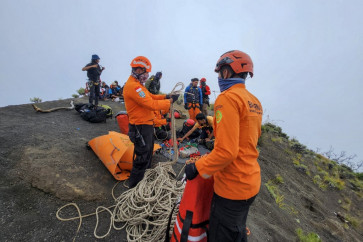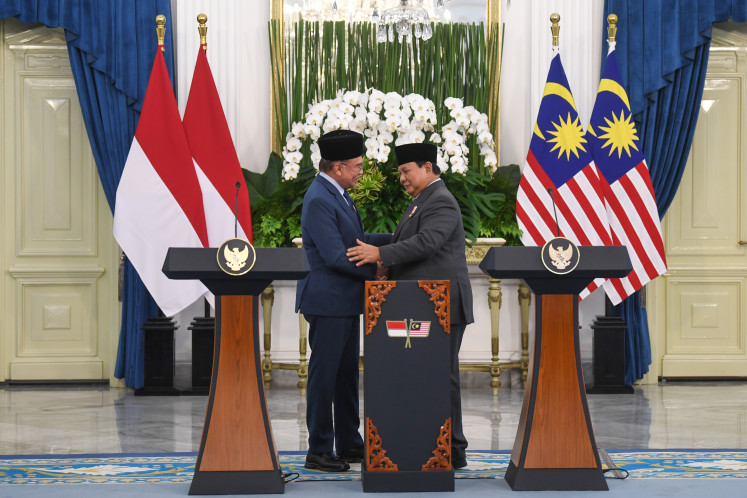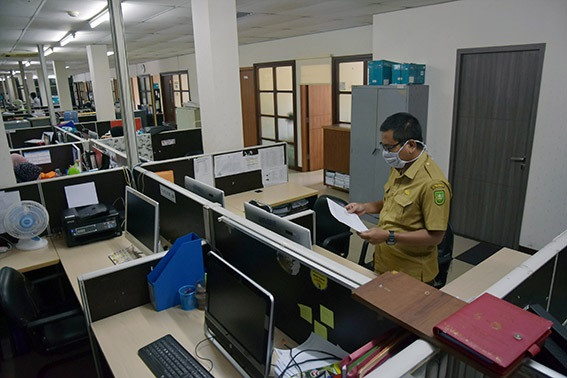Popular Reads
Top Results
Can't find what you're looking for?
View all search resultsPopular Reads
Top Results
Can't find what you're looking for?
View all search resultsDiving deep blue
Deepest blue: Just a few hundred meters offshore from the shallow waters of Tulamben, the ocean plummets to more than 160 meters deep
Change text size
Gift Premium Articles
to Anyone
 Deepest blue: Just a few hundred meters offshore from the shallow waters of Tulamben, the ocean plummets to more than 160 meters deep.(JP/JB Djwan)" height="338" border="0" width="510">Deepest blue: Just a few hundred meters offshore from the shallow waters of Tulamben, the ocean plummets to more than 160 meters deep.(JP/JB Djwan)
Deepest blue: Just a few hundred meters offshore from the shallow waters of Tulamben, the ocean plummets to more than 160 meters deep.(JP/JB Djwan)" height="338" border="0" width="510">Deepest blue: Just a few hundred meters offshore from the shallow waters of Tulamben, the ocean plummets to more than 160 meters deep.(JP/JB Djwan)Free diving, the art of plumbing the oceanâs great depths in one breath is fast becoming one of the âcoolestâ athletic arts around.
The Indonesian free diving national champion, former scuba diver Stanley Sradaputta, discovered the sport in a swimming pool in Sanur a few years back and has been hooked ever since.
âItâs very cool for people when they can hold their breath for five minutes underwater, so we come together like an elite group of people. Itâs very cool stuff,â said Stanley following his breaking of three Indonesian national records last week during the Australian Freediving Association (AFA) international competition in Tulamben on Baliâs northeast coast.
Stanley took out the âfree immersionâ at 65 meters deep, the âconstant with finsâ, again at 65 meters below the ocean surface and the âconstant no finsâ to a depth of 35 meters. His personal best is 5:45 minutes without a breath underwater, achievable due to what Stanley calls the âmammalian dive reflexâ, an adaption to how our bodies use oxygen under water.
In the crystal-clear waters of Tulamben, Stanley joined 19 other free divers from around the globe for the competition where divers swam breathless through the azure blue of Tulambenâs deep waters. Some journey down a rope to far below the surface, others swim down, expending that one breath as they travel through the deepening blue.
Some free divers reached depths of more than 100 meters; slowing their heart rate to reduce âconsumptionâ of the precious oxygen that is concentrated in their lungs under the pressures of the deep, explains Julia Mouce of the bodyâs response to underwater depths. Mouce, with free diving buddy Elianne Dipp, runs Apnea Bali, a center for free diving on the tourist island and host of the competition. Apnea means to be breathless, the women explain.
More and more athletes from around the world are arriving in this small seaside village on Baliâs northeast coast to learn the art of free diving, says Julia, with the greatest numbers coming from China.
âWe have guests from everywhere, but most are from China, Indonesia, Australia and France. There is a real boom for free diving, itâs a new and trendy sport in China,â says Julia. Partner Dipp says the sport is also âexplodingâ in Indonesia.
âI think this is because free diving is more of a lifestyle than a sport. It can mark your life, because you need a certain living pattern, conduct, to maintain diving ability,â says Dipp.
 Plunging action: Indonesian free diver Stanley Sradaputta plunges into the deep sea during the Australian Freediving Associationâs international competition on Aug. 27 to 30 in Tulamben, Bali, where he set three new national diving records.(Courtesy of Lucas Handley)
Plunging action: Indonesian free diver Stanley Sradaputta plunges into the deep sea during the Australian Freediving Associationâs international competition on Aug. 27 to 30 in Tulamben, Bali, where he set three new national diving records.(Courtesy of Lucas Handley)
People who smoke, drink and party the night away can learn to free dive, but their chances of improving depths are limited. âAn example is a student of mine who smoked four packs of cigarettes a day and was a drinker. He quit smoking and lost weight, not because you cannot free dive if you smoke and drink, but if you want to get better at this, you need to cut down, just like for a marathon,â says Julia.
Besides developing the ability to dive at great depth, free diving also enhances the enjoyment of the simple skill of snorkeling. âI feel free diving is exploding because many Indonesians and Australians love to snorkel. Scuba represents much more of an investment. With free diving you are given knowledge and that can improve your snorkeling ability, so you enjoy it more and are more confident in the water,â says Julia.
Indonesiaâs warm waters offer the perfect playground for free divers says AFA president Michael Bates. His association organized the free diversâ competition in Tulamben last week.
The tiny seaside village is the ideal destination for the sport says Bates, with its 160-meter plus ocean depths just a short boat ride from shore. So near is the drop off zone into the seaâs deeper reaches that the diversâ safety platform can be clearly seen from shore.
âIn Australia, the continental shelf is pretty wide, so itâs a long boat journey from shore to get the depths needed for an international level free diving competition. There are a lot of safety issues, such as a sea platform with all the requisite safety equipment. Apnea Bali has the sea platform and the expertise to host a world record competition,â says Michael, adding the âwarm waters, beautiful locality, the Liberty wreck just offshore and most importantly, the depths close to shore,â makes Tulamben the ideal place for the competition.
Another important factor is the availability of judges. Indonesiaâs mermaid, national record holder Nora Lestari, was on hand to judge the events in a sport she has taken to literally like a mermaid.
âUnder water is very quiet. Itâs a time to learn about ourselves and our limits,â says Nora of a sport that runs counter to most athletics where adrenalin bursts drive speed and strength.
A great diver slows their heart rate and meditates through the fear of plunging into the deep.
âThe name of the game in free diving is oxygen consumption. An elevated heart rate and adrenalin consumes oxygen faster, so you canât dive as long. Free divers want to be as relaxed as possible, to train in calmness,â says AFAâs Bates of this sport that is rapidly gaining followers around the globe.
 Indonesian mermaid: Indonesian champion free diver, Nora Lestari, judged an international competition on Aug. 27 to 30 in Tulamben, Bali.(JP/JB Djwan)
Indonesian mermaid: Indonesian champion free diver, Nora Lestari, judged an international competition on Aug. 27 to 30 in Tulamben, Bali.(JP/JB Djwan)
span class="caption">Deepest blue: Just a few hundred meters offshore from the shallow waters of Tulamben, the ocean plummets to more than 160 meters deep.(JP/JB Djwan) Free diving, the art of plumbing the ocean's great depths in one breath is fast becoming one of the 'coolest' athletic arts around. The Indonesian free diving national champion, former scuba diver Stanley Sradaputta, discovered the sport in a swimming pool in Sanur a few years back and has been hooked ever since. People who smoke, drink and party the night away can learn to free dive, but their chances of improving depths are limited. 'An example is a student of mine who smoked four packs of cigarettes a day and was a drinker. He quit smoking and lost weight, not because you cannot free dive if you smoke and drink, but if you want to get better at this, you need to cut down, just like for a marathon,' says Julia. A great diver slows their heart rate and meditates through the fear of plunging into the deep.
D
'It's very cool for people when they can hold their breath for five minutes underwater, so we come together like an elite group of people. It's very cool stuff,' said Stanley following his breaking of three Indonesian national records last week during the Australian Freediving Association (AFA) international competition in Tulamben on Bali's northeast coast.
Stanley took out the 'free immersion' at 65 meters deep, the 'constant with fins', again at 65 meters below the ocean surface and the 'constant no fins' to a depth of 35 meters. His personal best is 5:45 minutes without a breath underwater, achievable due to what Stanley calls the 'mammalian dive reflex', an adaption to how our bodies use oxygen under water.
In the crystal-clear waters of Tulamben, Stanley joined 19 other free divers from around the globe for the competition where divers swam breathless through the azure blue of Tulamben's deep waters. Some journey down a rope to far below the surface, others swim down, expending that one breath as they travel through the deepening blue.
Some free divers reached depths of more than 100 meters; slowing their heart rate to reduce 'consumption' of the precious oxygen that is concentrated in their lungs under the pressures of the deep, explains Julia Mouce of the body's response to underwater depths. Mouce, with free diving buddy Elianne Dipp, runs Apnea Bali, a center for free diving on the tourist island and host of the competition. Apnea means to be breathless, the women explain.
More and more athletes from around the world are arriving in this small seaside village on Bali's northeast coast to learn the art of free diving, says Julia, with the greatest numbers coming from China.
'We have guests from everywhere, but most are from China, Indonesia, Australia and France. There is a real boom for free diving, it's a new and trendy sport in China,' says Julia. Partner Dipp says the sport is also 'exploding' in Indonesia.
'I think this is because free diving is more of a lifestyle than a sport. It can mark your life, because you need a certain living pattern, conduct, to maintain diving ability,' says Dipp.
Besides developing the ability to dive at great depth, free diving also enhances the enjoyment of the simple skill of snorkeling. 'I feel free diving is exploding because many Indonesians and Australians love to snorkel. Scuba represents much more of an investment. With free diving you are given knowledge and that can improve your snorkeling ability, so you enjoy it more and are more confident in the water,' says Julia.
Indonesia's warm waters offer the perfect playground for free divers says AFA president Michael Bates. His association organized the free divers' competition in Tulamben last week.
The tiny seaside village is the ideal destination for the sport says Bates, with its 160-meter plus ocean depths just a short boat ride from shore. So near is the drop off zone into the sea's deeper reaches that the divers' safety platform can be clearly seen from shore.
'In Australia, the continental shelf is pretty wide, so it's a long boat journey from shore to get the depths needed for an international level free diving competition. There are a lot of safety issues, such as a sea platform with all the requisite safety equipment. Apnea Bali has the sea platform and the expertise to host a world record competition,' says Michael, adding the 'warm waters, beautiful locality, the Liberty wreck just offshore and most importantly, the depths close to shore,' makes Tulamben the ideal place for the competition.
Another important factor is the availability of judges. Indonesia's mermaid, national record holder Nora Lestari, was on hand to judge the events in a sport she has taken to literally like a mermaid.
'Under water is very quiet. It's a time to learn about ourselves and our limits,' says Nora of a sport that runs counter to most athletics where adrenalin bursts drive speed and strength.
'The name of the game in free diving is oxygen consumption. An elevated heart rate and adrenalin consumes oxygen faster, so you can't dive as long. Free divers want to be as relaxed as possible, to train in calmness,' says AFA's Bates of this sport that is rapidly gaining followers around the globe.

Your Opinion Matters
Share your experiences, suggestions, and any issues you've encountered on The Jakarta Post. We're here to listen.
Thank You
Thank you for sharing your thoughts. We appreciate your feedback.
Share options
Quickly share this news with your network—keep everyone informed with just a single click!
Gift Premium Articles
to Anyone
Share the best of The Jakarta Post with friends, family, or colleagues. As a subscriber, you can gift 3 to 5 articles each month that anyone can read—no subscription needed!
Continue in the app
Get the best experience—faster access, exclusive features, and a seamless way to stay updated.









